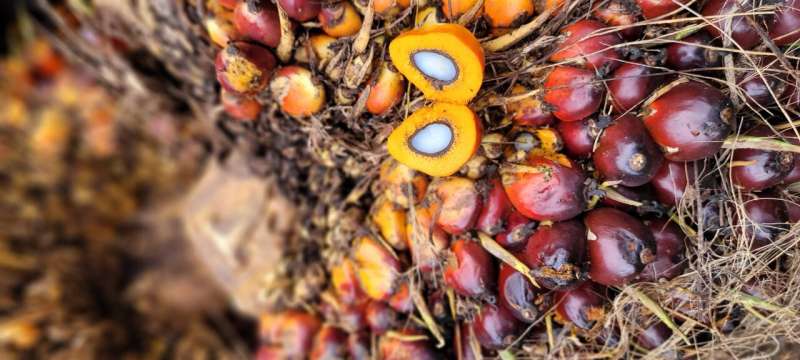This article has been reviewed according to Science X's editorial process and policies. Editors have highlighted the following attributes while ensuring the content's credibility:
fact-checked
trusted source
proofread
Is there more to palm oil than deforestation?

Palm oil is the world's most produced and consumed vegetable oil and everyone knows that its production can damage the environment. But do consumers have the full picture? In fact, replacing palm oil with rapeseed oil would require a four to five-fold increase in the amount of land needed.
Research led by the University of Göttingen investigated the attitudes, beliefs and understanding about palm oil of the general public in Germany, and how this links to land use. The researchers show that people find it hard to know the consequences of their buying choices, even when extra information is supplied. The results were published in Sustainable Production and Consumption.
For this study, researchers first conducted an in-depth literature review on the effects of "indirect land use change" to assess the effects of switching from palm oil production. "Indirect land use change" refers to the effects on the environment due to land use change resulting from the increased demand for certain agricultural crops or biofuels. They then conducted an online survey on a sample of 1,247 people in the German population.
Among other issues, questions covered the overall importance of palm oil in the food industry and explored how people felt about the "free from palm oil" claim compared to a certification label, the consequences of land use change and comparisons with using other vegetable oils. They then measured the effect of providing consumers with extra information in the form of two separate infographics: one on palm oil generally and the other on indirect land use change specifically.

The results showed that product information and labeling can produce a confusing and misleading picture for consumers. The provision of extra information influenced responses but the effect was small. Customers were attracted to the "free from palm oil" label.
They showed more trust towards it and perceived it as superior from both health and environmental perspectives, even if for the latter sustainably produced palm oil might be a more environmentally-friendly option. After receiving the additional information, many consumers were still skeptical about the potential benefits of sustainably produced palm oil in comparison with other vegetable oils such as soybean, sunflower and rapeseed oil.
Findings from this study are important as they provide insights into how consumers can be encouraged to grapple with complex and often controversial food choices. "Consumers have limited time to weigh up the social, environmental or health attributes of products," says Sophie-Dorothe Lieke from Göttingen University's Department of Agricultural Economics and Rural Development.
Lieke adds, "Our research shows that many find the information overwhelming and want clear, reliable guidance. This could be in the form of introducing an 'eco-label' which would not only pick up differences in production systems but also help guide shoppers in making more informed decisions about the environmental impact their purchases have."
More information: Sophie-Dorothe Lieke et al, Can consumers understand that there is more to palm oil than deforestation?, Sustainable Production and Consumption (2023). DOI: 10.1016/j.spc.2023.05.037
Provided by University of Göttingen


















